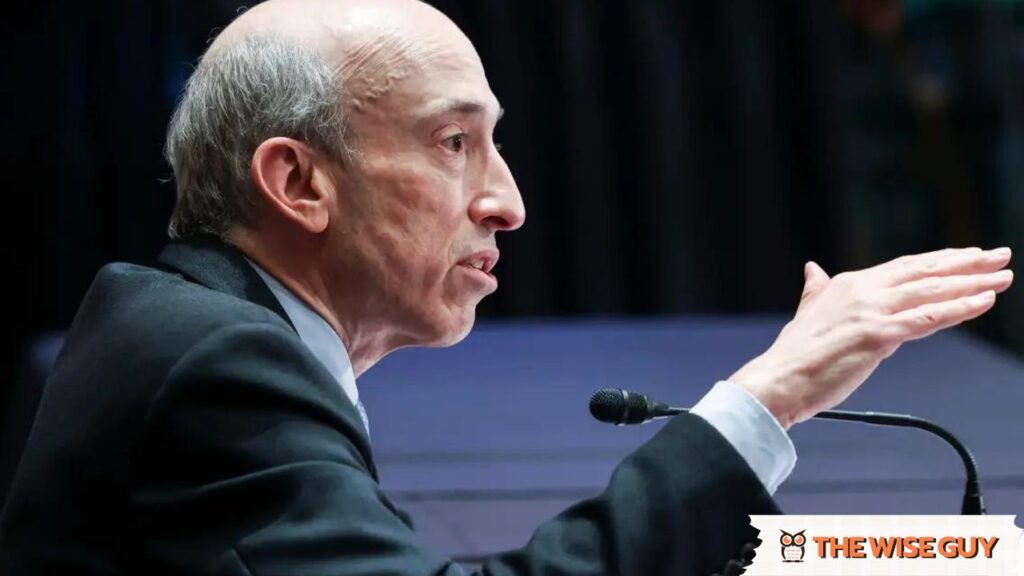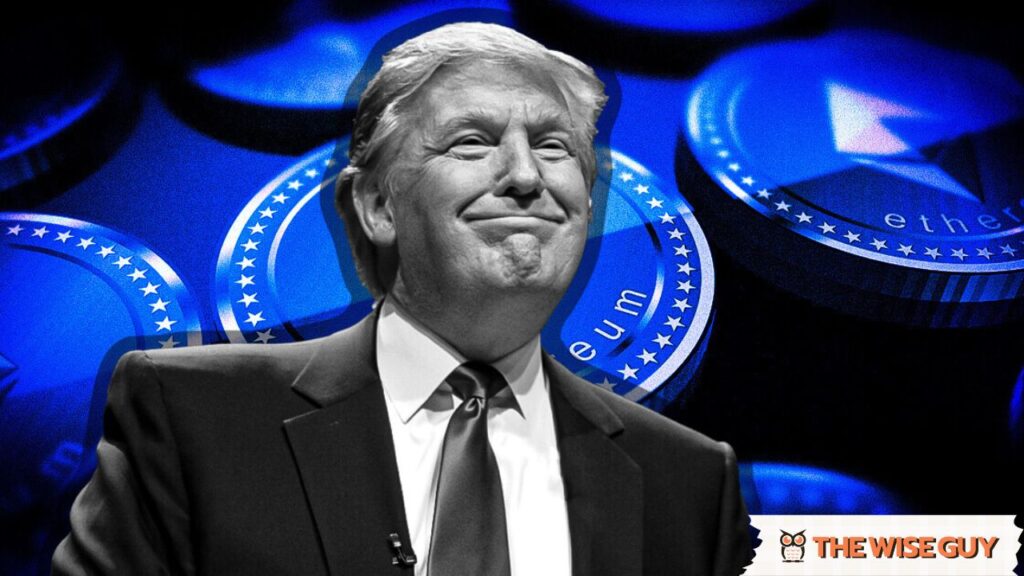???? GM,
Grab your favorite beverage (even if it’s a little early, we won’t tell), and get ready for the juiciest headlines that have been lighting up the Internet this week! ????
1️⃣ Elon Musk’s Biography Mentions Dogecoin 4 Times
2️⃣ Vitalik Buterin reveals how his X account was hacked
3️⃣ Gary Gensler Blames Crypto Industry For Non-Compliance
4️⃣ Editor’s Wrap: Trump’s Ethereum Wallet Is Bleeding Red

Elon Musk’s Biography Mentions DOGE 4 Times And We Can’ Get Over It

In the highly-anticipated biography of Elon Musk, written by Walter Isaacson, the mention of Dogecoin (DOGE) makes significant appearances throughout the narrative. Here’s a recap of four key quotes from the biography that delve into Musk’s connection with the meme cryptocurrency:
- “Ellison had not tweeted in a decade. In fact, he could not remember his Twitter password, so Musk had to personally get it reset for him. But he believed that Twitter was important. ‘It’s a real-time news service, and there’s nothing really like it,’ he told me. ‘If you agree it’s important for a democracy, then I thought it was worth making an investment in it.'”
This quote highlights Musk’s belief in the importance of Twitter as a platform for real-time news. Despite his own challenges with using the platform, he considers it valuable for democratic discourse.
2.“One person who was eager to be in the deal was Sam Bankman-Fried, the soon-to-be-disgraced founder of the cryptocurrency exchange FTX, who believed that Twitter could be rebuilt on the blockchain… Musk had discussed with Kimbal and others the possibility of using the blockchain as a backbone for Twitter. But despite the fun he had with Dogecoin and other cryptocurrencies, he was not a blockchain acolyte and he felt it would be too sluggish to support fast-paced Twitter postings.”
Here, the biography touches upon Musk’s discussions surrounding the use of blockchain technology as the foundation for Twitter. While he recognized the potential, he expressed concerns about the blockchain’s ability to support the speed and efficiency required for Twitter’s real-time nature.
3.”[After the Gala,] Musk and Grimes hosted a party at the hot club Zero Bond in Manhattan’s NoHo neighborhood. Leonardo DiCaprio and Chris Rock were among the celebrities who came. But for much of the party, Musk stayed in a back room, mesmerized by a magician performing tricks. ‘I went to get him so he would come up front to greet people, but he wanted to stay longer watching the magician,’ Maye says.”
In this excerpt, the biography offers a glimpse into Musk’s affinity for magic and his fascination with a magician’s performance during a party. It highlights his inclination towards being captivated by intriguing and unconventional spectacles.
4.“The parking area was festooned with art installations like those at Burning Man, arcade games, bandstands, a mechanical bull, a giant rubber duck, and two towering Tesla coils. Inside, parts of the factory were staged to look like a nightclub. Kimbal helped put together a drone show that featured likenesses of Nikola Tesla, the dog mascot, and a Cybertruck in the night sky. Celebrities included Harrison Ford, Spike Lee, and the artist Beeple, who had created an installation.”
This passage describes the extravagant opening celebration of Giga Texas, where Musk’s brother Kimbal played a significant role in organizing a drone show featuring various elements associated with Elon Musk’s ventures, including the likeness of Nikola Tesla, the dog mascot (referring to Doge), and a Cybertruck. The event was attended by notable celebrities and showcased a fusion of technology, art, and entertainment.
Vitalik Buterin reveals X account hack was caused by SIM-swap attack

Ethereum co-founder, Vitalik Buterin, recently fell victim to a SIM swap attack, resulting in the compromise of his Twitter account, X.
Speaking on the decentralized social media platform, Farcaster, Buterin confirmed that the attack was carried out by social engineering T-Mobile to gain control of his phone number. Buterin revealed that he has now regained control of his T-Mobile account after the incident.
He emphasized the lessons learned from this unfortunate experience. Buterin highlighted that a phone number alone can be used to reset a Twitter account password — even without being used for two-factor authentication (2FA). He advised users to consider removing their phone numbers entirely from their Twitter accounts, a piece of advice he himself had overlooked before the attack.
???????? “A phone number is sufficient to password reset a Twitter account even if not used as 2FA,” Buterin stressed, noting that users have the option to “completely remove [a] phone from Twitter.”
He admitted that he had come across the advice that phone numbers are insecure for authentication purposes but didn’t fully comprehend the implications until this incident.
The hack on Buterin’s X account occurred on September 9, when scammers infiltrated his account and posted a phony NFT giveaway scam, resulting in victims losing a staggering $691,000.
Prompted by this incident , Ethereum developer Tim Beiko strongly advocated for the removal of phone numbers from Twitter accounts and the enabling of 2FA. He urged the platform’s owner, Elon Musk, to consider making 2FA a default setting for accounts with a significant number of followers, stating that it seemed like a “no-brainer” precautionary measure.
The breach of Buterin’s Twitter account was made possible through a SIM swap attack, also known as simjacking. This technique allows hackers to take control of a victim’s mobile phone number, granting them access to social media, banking, and cryptocurrency accounts that rely on 2FA for authentication.
This is not the first time T-Mobile, the telecom giant, has been involved in such attacks. In 2020, the company faced legal action for allegedly enabling the theft of $8.7 million worth of cryptocurrency through a series of SIM swap attacks. In February 2021, T-Mobile was sued once again when a customer lost $450,000 in Bitcoin due to another SIM swap attack.
SIM swap attacks highlight the vulnerabilities of relying solely on phone numbers for authentication. It serves as a reminder for individuals and organizations to implement additional layers of security, such as using authenticator apps or hardware keys, to enhance account protection.
???? As the cybersecurity landscape continues to evolve, it is crucial for users to stay vigilant and take proactive measures to safeguard their online accounts. This incident involving a prominent figure like Vitalik Buterin serves as a wake-up call for the importance of robust security practices. With the increasing prevalence of social engineering attacks, it is essential not to underestimate the potential consequences of overlooking basic security measures.
Gary Gensler Blames Crypto Industry For Non-Compliance

SEC Chair Gary Gensler is set to testify on Capitol Hill, and while his prepared remarks indicate his unwavering views on the cryptocurrency industry, it seems he has some stern words to share. Gensler’s written statements suggest that the crypto industry is facing significant challenges when it comes to compliance with securities laws, comparing the current state of affairs to the lawless days of the 1920s before federal securities regulations were implemented.
Gensler has been consistent in his position that existing securities laws in the United States do not need to be revised to accommodate cryptocurrencies. He believes that the majority of crypto tokens likely meet the investment contract test, which classifies them as securities.
Interestingly, Gensler implied that, apart from Bitcoin, almost all other cryptocurrencies should be considered securities based on the application of the famous Howey Test.
However, the classification of Ethereum as a security or commodity remains unresolved. Gensler has been hesitant toprovide a definitive answer on Ethereum’s classification during previous appearances before the House Oversight Committee. The distinction between securities and commodities is crucial as it determines the regulatory oversight under either the SEC or the Commodity Futures Trading Commission.
Editor’s Wrap: Trump’s Ethereum Wallet Is Bleeding Red

Former President Donald Trump, known for his eventful tenure in the White House, has seen a significant decrease in the value of his cryptocurrency holdings. Data provided by Arkham Intelligence reveals that Trump’s Ethereum wallet, which holds 1,552 ETH, has experienced a loss of $21,830 due to the recent downturn in the overall crypto market.
Interestingly, despite his initial skepticism towards cryptocurrencies, Trump has actively engaged with the space. As early as last year, he launched his own non-fungible token (NFT) project, called “Trump Digital Collectible Cards,” featuring exclusive images of himself. The project gained substantial popularity and generated impressive licensing fees of $4.87 million from the sale of his NFT collection.
It is worth noting that Trump’s involvement in cryptocurrencies aligns with the growing attention and interest in the digital asset space within the political sphere as the 2024 presidential election approaches. Robert F. Kennedy Jr., a Democratic presidential hopeful, has publicly confirmed his ownership of Bitcoin, while Republican candidate and Florida governor, Robert DeSantis, has pledged to ban central bank digital currencies (CBDCs) if elected to the presidency.
CoinWestern Quixplaned????
????Is Ethereum Heading for a Disaster? Benjamin Cowen Sounds the Alarm
????FTX’s $3.4 Billion crypto liquidation: What you need to know
????Ethereum transaction fees dive to 2022 lows, paving the way for wider adoption
Top Reddits This Week That Got Our Attention
Does the halving cut sell pressure in half?
Bitcoin is better than real estate because of Higher Liquidity and faster Cash Outs
Shrinkflation: a subtle way to hide inflation
Twice weekly crypto goodness, coming your way! Catch us every Tuesday and Friday. Mondays, read our All-In-One crypto newsletter. And hey, don’t forget to check us out on Wednesdays for all the latest AI news – because why limit yourself to just one kind of intelligence?


